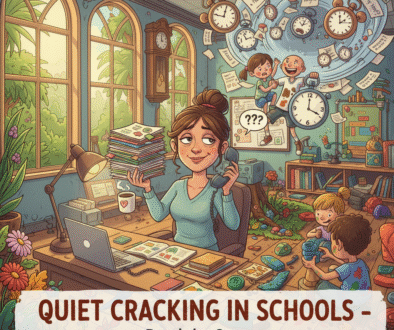Unmasking Happiness: The Path to Authentic Emotions

The Tyranny of Positivity: When Smiles Become Homework
“Stay positive.”
“Good vibes only.”
“Look on the bright side.”
How many times have you heard these lines? They sound nice on mugs and posters, but in real life they can feel like someone sticking tape over your mouth. Positivity has turned into a rule, a performance, something we owe the world — even when our heart is breaking.
The Child Who Wasn’t Allowed to Cry
The other day, a little boy in class cried because his tower of blocks collapsed. He was really sad, and honestly, it mattered to him. But before he could even wipe his tears, another adult rushed over: “Don’t cry… it’s ok.”
And there it was — lesson delivered. Your sadness is inconvenient. Your tears make people uncomfortable. Smiling is the only socially acceptable answer.
But is that real strength? No. Real strength is when the child can sit with the broken tower, feel upset, and then — when he’s ready — build again. That’s what positivity should mean: not hiding feelings, but growing through them.
Spirituality in Glitter and Filters
The same thing happens in spirituality. Scroll through Instagram and you’ll find gurus in linen shirts or shiny dresses telling you to “raise your vibrations” and “stay in the light.” And if you’re sad? Well, clearly you’re doing spirituality wrong.
This is just another mask. Real spirituality knows darkness too. It sits with you at funerals. It listens when you say, “I’m not okay.” It lets children feel frustration and loss instead of sweeping it away with sparkly mantras. Light only means something if we can face the dark too.
The Smile Tax at Work
Grown-ups aren’t free from this either. In schools and offices, you often hear: “Don’t complain, don’t bring negativity, be a team player.” Which usually translates into: “Stay quiet about what’s unfair.”
It’s exhausting. And worse, it protects broken systems. As long as everyone smiles, nothing has to change. Positivity becomes a cover-up, not a solution.
Culture and Obedience
Of course, positivity wears different masks in different places.
-
In some cultures, it means: never question the boss.
-
In others, it means: hope and resilience, but with honesty.
But almost everywhere, children are taught early to fake it: “Say thank you even if you don’t mean it. Smile for the photo. Don’t cry, be a good boy/girl.” We grow up learning that being “positive” matters more than being true.
A Reflection on
Letting Emotions Go
Sometimes I catch myself wondering: maybe we’ve got this whole positivity thing upside down. We treat it like chasing the light and pretending the dark doesn’t exist. But life was never meant to be only daylight.
Maybe, unknowingly, I always knew — whether in my subconscious or conscious mind — that I can’t store emotions inside. I have to let them go, clean myself. Does that make me negative? I would say no.
Even as a Christian, and later while adapting Indian philosophy into my life, I understood myself better. People sometimes told me I was silly, or that I shouldn’t say certain things because it sounded “negative.” But to me, naming what is real is not negative — it’s acceptance.
It’s saying: yes, I feel this. And because I know it, I can also change it. I can do better. That’s awareness. Anything else is like pushing dirt under the bed. On the surface it looks shiny, candy-like, impressive — but the dirt is still there.
So I ask myself: is this what positivity has become? A bubble? A performance?
So What Is Positivity?
For me, positivity is not about grinning through pain. It’s not “good vibes only.” It’s not forcing kids or adults into masks.
Positivity is the courage to face what hurts and still believe something good can grow from it.
Sometimes that’s a child crying until he’s ready to try again.
Sometimes it’s a teacher saying, “This workload is unfair.”
Sometimes it’s a friend whispering, “Please don’t cheer me up, just sit here with me.”
That’s real positivity. It doesn’t silence pain — it carries it with hope.
A Future Without Fake Smiles
If we want our children — and ourselves — to live honestly, we need to stop turning smiles into homework. Let them cry. Let them frown. Let them say, “I’m not okay.”
Because positivity isn’t about pretending everything’s fine. It’s about knowing that even in the mess, even in sadness, life is still worth showing up for.
And sometimes, the bravest thing you can do is not to smile — but to be real.
Sometimes, the realest smile is the one that comes after tears.


